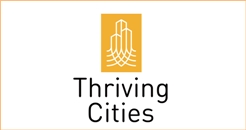 Thriving Cities (or towns)
Thriving Cities (or towns)
From a report by the Institute for Advanced Studies in Culture
The Thriving Cities Group is a non-profit spun out of research by the Institute for Advanced Studies in Culture, University of Virginia, USA whose vision is "to see a world where all individuals and institutions work together in order to make the common good".
For the first time in human history, more humans live in urban environments than not, and this demographic trend will only increase dramatically in coming decades. This means that both the challenges to and opportunities for human thriving are principally urban in character.
At its most basic, thriving is about realizing our fullest potential as individuals and communities. Thriving is a holistic endeavour that is impossible outside relationships of reciprocity, interdependence, shared contexts of opportunity, and impossible without strong sources of moral concern.
Thriving Cities is committed to research and tools that empower key stakeholders; including foundations, city officials, city planners, religious leaders, politicians, educators, business people, academics, non-profits, and residents to ask and answer the question: What does it mean and take to thrive in my city, and how can I contribute?
Thriving Cities builds upon a “human ecology” framework. This sees cities as complex, asymmetric, and dynamic social systems that both empower and constrain the ways of life and life chances of their residents. Their framework examines six fundamental areas of community wealth and well-being:
-
The True- the realm of human knowledge and learning. Resources & Practices: Research, innovation, teaching, transfer of knowledge, cultural and historical preservation, etc. Institutions & Places: Universities, libraries, public schools, public squares, media, public art, job training centres, book stores, community gardens, etc.
-
The Prosperous - the realm of economic life. Resources & Practices: Work, investment, capital exchange, land development, philanthropy, production/consumption, technology, innovation, etc. Institutions & Places: Industries, businesses, real estate, innovation districts, job training centres, transit oriented development, vendors/farmer’s markets, etc.
-
The Good - the realm of social mores and ethics. Resources & Practices: Parenting, early childhood development, moral formation, charitable giving, volunteering, community conversation, etc. Institutions & Places: Families, religious organizations, after-school programs, charities, schools, community centres, sports, social services, farmer’s markets, etc.
-
The Just and Well-Ordered - the realm of political and civic life. Resources & Practices: Political deliberation, civic engagement, law and order, community organizations, protest/demonstration, city planning, zoning, etc. Institutions & Places: Local government, public spaces for democratic processes, city hall, community centres, civic groups, public transportation and housing, etc.
-
The Beautiful - the realm of creativity, aesthetics, and design. Resources & Practices: Design of the built environment, city planning, public art, festivals, cultural entertainment, creative placemaking, etc. Institutions & Places: Community planning boards, public art/galleries, restaurants, public spaces/promenades/gardens, commemorative sites, innovation districts, etc.
-
The Sustainable - the realm of natural and physical health. Resources & Practices: Management of energy and land, air quality, public/human health, environmental regulations and advocacy, emission, waste, sanitation, etc. Institutions & Places: Public parks/forests, green infrastructure, hospitals/clinics, bike lanes, sidewalks, restaurants, local food hub, environmental organizations, etc.
Like a mosaic, the endowments are fragments of a broader picture that help to frame a community or city in a holistic light. Crucial to appropriating the six endowments is understanding that though ever present, they function uniquely within the particular contexts of each place. Each city has its own signature and mosaic of thriving. By telling the story of a city in terms of the six endowment framework, each profile provides new and fresh insights that can help local stakeholders better assess and invest in the human ecology of their cities.
The possibility of thriving in any city starts by securing basic conditions of material well-being for its citizens, and extends through a range of human connections, collaborative projects, and civic commitments:
-
Conditions: the basic conditions of material security & social well-being.
-
Connections: the relationships & public places that bond & bridge communities.
-
Collaboration: the unique & unusual forms of collective action.
-
Commitments: the core identities & values that motivate & sustain care for others.
Read the original project report here.
The above speaks to 'welfare of the city' Jeremiah 29v7. Added to 'your kingdom come, your will be done', it's a great prayer list for your town or city.
Retweet about this article:
From a report by the Institute for Advanced Studie, 07/02/2023